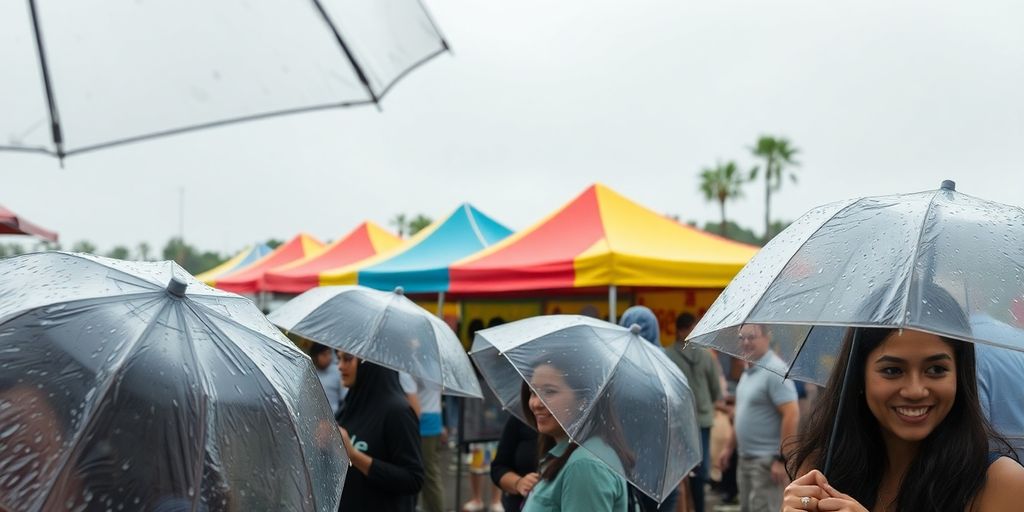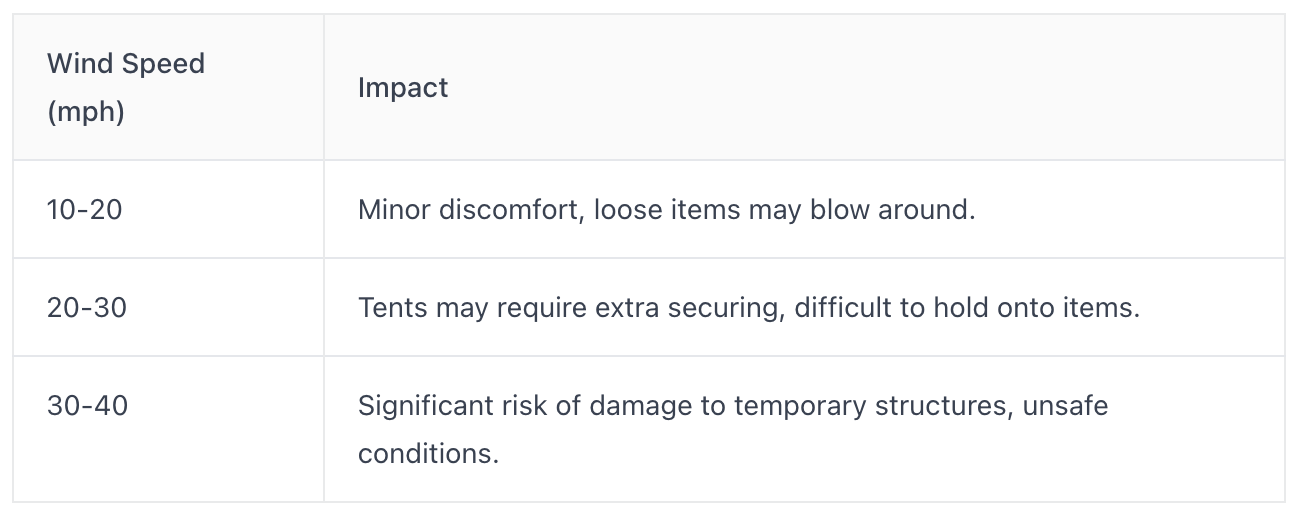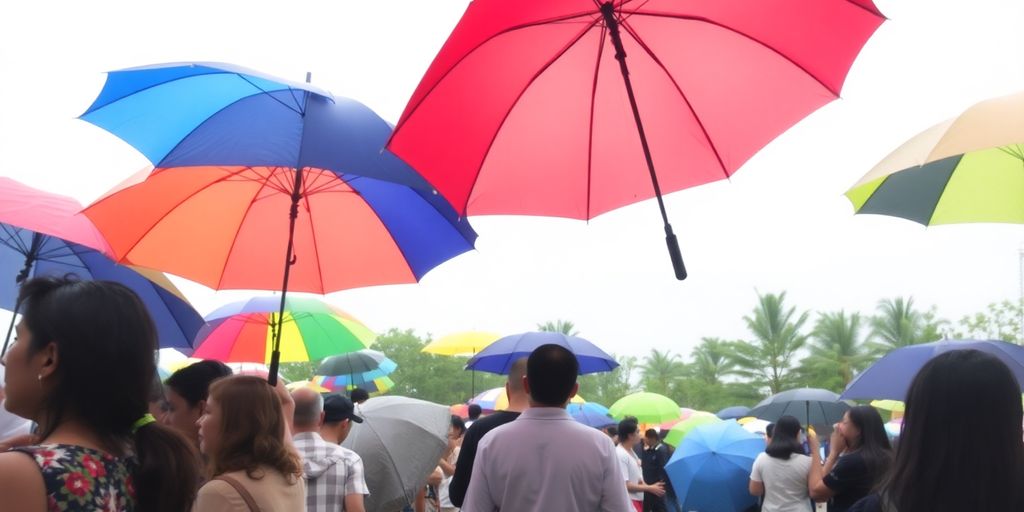Register as an organizer
Click the button below and finish your organizer registration, or fill out the form and we will be in touch to assist you.
.jpeg)
We all look forward to the energy and excitement of outdoor events, but there’s one unpredictable factor that can make or break the experience: the weather. Inclement weather planning for outdoor events plays a huge role in whether people decide to show up, stick around, or skip out on outdoor gatherings entirely. A sudden downpour, blistering heat, or strong winds can quickly change everyone’s plans, leaving even the most carefully organized event feeling empty. Most of us make our decisions based on forecasts and whatever’s happening in the sky that day. Crummy conditions don’t just mess with comfort or safety – event logistics and the vibe of a crowd can flip in a heartbeat if the weather turns. We keep refreshing our weather apps, fingers crossed, but at the end of the day, what’s outside really decides who shows up.

Our decision to attend an outdoor event often depends on the weather. When conditions become extreme—too hot, cold, wet, or windy—we naturally consider our comfort, safety, and how much fun we'll actually have before leaving the house.
When it's sweltering, most of us retreat indoors to escape the heat. High temperatures can lead to dehydration, sunburn, and general discomfort, making hours at an outdoor event unappealing. It's not just about sweat and sticky clothes—there are real health risks, especially for kids and older adults. Icy winds and cold snaps? Not much better. Shivering through a concert or market isn't anyone's idea of fun. Turnout drops fast when the forecast calls for uncomfortable temperatures. Organizers often notice ticket sales lagging when extreme weather looms. Mild, pleasant days, though, tend to bring out bigger crowds. So, both heat and cold can mess with attendance, sometimes making us change our minds at the last minute and stay home. Consider climate change risks when planning your event.
Rain and thunderstorms are notorious for dampening spirits and driving people away. Few want to sit through a downpour, even if they're equipped with umbrellas and raincoats. Thunderstorms bring the added threat of lightning, making outdoor gatherings downright dangerous.
I remember one outdoor concert I went to last summer. The music was great, but halfway through, a thunderstorm rolled in. Everyone scattered, seeking shelter under trees or running to their cars. The concert was canceled, and the whole experience was a soggy disappointment.
Unexpected wind can be more than just a nuisance; it can create safety hazards and disrupt event setups. Strong gusts can topple tents, blow away decorations, and make it difficult for vendors to operate. High winds can also make it uncomfortable for attendees, especially if they're trying to enjoy food or drinks.
Here's a quick look at how wind speed can affect an event:

We all love the idea of outdoor events, but let's be real, the weather can totally mess things up. Weather has a huge impact on whether people show up, stay, or just bail on outdoor events. A sudden downpour, crazy heat, or strong winds can change everything, even if the event was super well-planned.
Most of us check the forecast and look outside before deciding what to do. Bad weather doesn't just make things uncomfortable or unsafe – it can flip event logistics and the whole vibe in a heartbeat. We're constantly refreshing our weather apps, hoping for the best, but at the end of the day, the weather decides who actually shows up.
As event planners, we know weather can force us to switch venues, delay start times, or just cancel. Rain, heat, or surprise wind gusts push us to set up tents, rent canopies, or move things inside if we can. Last-minute changes shrink available space or cut down seating, which means guest flow needs a total rethink. Sometimes, severe storms or snow just make it impossible—or unsafe—for crews and guests to gather. Then we’re stuck juggling refunds, rescheduling, or maybe offering digital alternatives. It’s a headache, but safety and comfort always take priority. Good weather data is a lifesaver. We rely on phone alerts and detailed forecasts, not just crossed fingers. Sticking with reputable sources helps us keep everyone in the loop and cut down on confusion. For more on prepping for unpredictable weather, check out this event planning and weather guide.
Weather problems can start even before guests arrive. Heavy rain, snow, or ice can delay transportation, disrupt vendor deliveries, or reduce turnout. We scramble to figure out alternative routes, set up shuttle services from far-off parking spots, or warn people about possible delays. Parking lots can turn into mud pits, making it tough for cars to get in and out. Here's a quick look at how weather can impact travel:
It's important to communicate these issues clearly and quickly. Use social media, email, and even signage to keep everyone informed and safe.
Weather can really mess with on-site operations. Setting up and taking down equipment becomes way harder in the rain or wind. Electrical equipment needs extra protection, and you have to make sure everything is secured to prevent accidents. Power outages are always lurking. Backup generators aren’t optional—they’re essential. If weather throws us a curveball, our tech crews have at least a few backup plans on deck. Every adjustment helps us keep things running, no matter what.

Different outdoor events react in their own way to weather. How attendees respond depends on the event type, what’s at stake, and how flexible the activities are. Some events are more weather-sensitive than others.
Let’s be real—everyone knows someone who’ll watch their team play football in the pouring rain, but that same friend will bail on a music festival if storms are brewing. Sports fans are loyal and often willing to tough it out. Stadiums and big sports venues usually have partial covers or can shift game times to dodge weather issues. Music festivals, though, are sprawling outdoor productions with open stages, sensitive gear, and crowds—so storms mean extra risks. Electrical hazards and muddy grounds can cause delays or outright cancellations, which is a big safety and revenue concern. Some festival fans come ready with ponchos and boots, but severe or unpredictable weather often sends people home early or keeps them away. Sports enthusiasts might stick it out, but festival organizers usually won’t gamble with safety or comfort. For more information, check out this event planning and weather guide.
Neighborhood barbecues and local fairs are even more sensitive to bad weather. These events are often run by volunteers or small groups, so weather-proofing is limited. Community tents just can’t compete with stadiums. Attendance at family reunions, outdoor weddings, or school carnivals drops fast if rain threatens. Not many of us want to sit through Grandma’s anniversary toast under a leaky tent. Hot, humid weather brings health risks, especially for older adults and kids, putting a damper on festivities.
When the weather turns, it’s not just about comfort – heat exhaustion, slick surfaces, and cancellations become real issues, and turnout almost always shrinks. We’ve all been to an event where attendance “depends on the weather,” and, honestly, that’s usually how it goes.
When planning a family gathering, always have a backup plan. If the weather looks iffy, consider moving the event indoors or postponing it to another day. This will help ensure that everyone stays comfortable and safe, and that the event is a success.
When planning outdoor events, it's more than just checking the short-term forecast. Looking at past weather and understanding typical patterns can help avoid problems and increase attendance.
Looking at old weather data is a smart move when predicting event success. Things like rain frequency, heatwaves, or unexpected cold snaps can give you a heads-up on potential issues. For example, if your town always has storms every third weekend in July, you can plan for tents or choose a different date. Most planners I know check at least the last decade of weather records, looking for unusual years. Using climatological forecasting can help you make informed decisions.
Past bad weather sticks in people’s minds. Even if the forecast is good, memories of muddy parking lots and traffic jams can keep people away. Showing you're prepared helps rebuild trust. Sometimes, when things seem risky, offering perks to ticket holders can encourage them to come.
The season affects more than just rain or sun; it shapes what people want to do. Outdoor concerts are popular in late spring, and autumn markets are packed when the air turns crisp. Matching your plans to the season gives you a better chance at higher turnout and happier guests.
Consider these basics:
We pay attention to temperature, humidity, and daylight. July afternoons? Too hot, so we plan sunset events. Holidays and school breaks are also important.
Here's a quick cheat sheet:

Let's face it, most of us are glued to our phones, constantly checking the weather and scrolling through social media. A sudden change in weather, like a surprise rain shower or a burst of sunshine, can completely change our plans, especially when it comes to outdoor events.
People are more aware of safety than ever before. If there's even a hint of severe weather, folks are going to think twice about attending an event. Public perception is everything. It only takes one bad experience to turn people away for good. Organizers need to be proactive in addressing these concerns and communicating safety measures.
FOMO, or the fear of missing out, can be a powerful motivator, but even FOMO has its limits when the weather is bad. People are constantly checking weather forecasts, and if the forecast looks grim, they're less likely to attend, no matter how much they want to be there. It's a tough balance between wanting to be part of the fun and not wanting to suffer through miserable conditions.
Social media has changed the game when it comes to event attendance. Real-time updates and social proof can make or break an event. People are constantly posting pictures and videos, giving others a glimpse of what's really happening. If the event looks fun and the weather seems manageable, people are more likely to attend. But if the event looks like a disaster, with mud everywhere and people running for cover, they're going to stay home.
It's all about what people are seeing and hearing in real-time. If the social media buzz is positive, attendance will likely be good. But if the buzz is negative, attendance will suffer. Organizers need to be aware of this and actively manage their social media presence to create a positive image, even when the weather isn't cooperating.
Bad weather does more than just ruin a day; it can really mess up the money situation for event organizers and nearby businesses that were banking on those crowds. Whether it's scorching heat, heavy rain, or a sudden storm, the financial hit can be pretty significant.
When bad weather hits, event planners face tough choices: offer refunds, try to reschedule, or just call it off completely. None of these options are cheap. Refunds can quickly drain the budget, and vendors are often left with unsold goods. If a storm rolls in right before a big festival, that could mean thousands of tickets refunded and food vendors stuck with a ton of wasted stock.
Trying to reschedule? That's a whole different problem. Finding new dates that work for everyone is tough, and not all attendees or performers will be able to make it. This leads to even more refunds, fewer attendees, and extra costs for marketing and logistics. Even if the event does go on, extreme heat or rain can scare people away, which means less spending at food stands and merchandise booths. It's a domino effect that hits everyone involved. You might need to consider event insurance to protect yourself from these losses.
It's not just the event organizers who feel the pinch. Local businesses, like restaurants, hotels, and shops, also suffer when an event gets rained out. These businesses often rely on the influx of visitors attending the event to boost their sales. When the event is canceled or attendance drops, they see a corresponding decrease in revenue. Tourism, a key sector for many regions, can take a major hit.
Imagine a small town hosting a large music festival. The local hotels are fully booked, restaurants are packed, and shops are selling souvenirs like crazy. Now, picture a severe thunderstorm forcing the festival to cancel. Suddenly, those hotel rooms are empty, the restaurants are quiet, and the shops are left with unsold merchandise. The entire local economy feels the impact.
Here are some ways local businesses can be affected:
So, what's the big takeaway here? When you're putting together an outdoor event, the weather isn't just some small detail; it's a huge player. It can totally change how many people show up, how much fun everyone has, and even if the event makes money. Being ready for anything—whether it's a sudden downpour or a heatwave—isn't just a good idea, it's a must. By thinking ahead, checking those forecasts, and having a few backup plans, you can make sure your event goes off without a hitch, no matter what the sky decides to do. It's all about being smart and flexible so everyone, including you, can have a good time.
When an event says "rain or shine," it means it's happening no matter what the weather does. But let's be real, a lot of people will still decide to stay home if it's pouring or super cold. Nobody wants to be uncomfortable or risk getting sick, even if they bought a ticket.
Yes, a bad weather forecast can definitely scare people away from festivals. Even if the weather ends up being fine, just the prediction of storms or heavy rain can make people change their plans. It's a big reason why attendance can drop.
Yes, bad weather can hit an event's money hard. Organizers might have to give refunds, which means losing ticket sales. They might also have to pay extra to reschedule, or they could lose money if fewer people show up and don't buy food or merchandise.
Social media plays a huge role! People share what's happening in real-time, whether it's good or bad. If it looks like a muddy mess or everyone's having a great time in the sun, those posts can quickly convince people to either go or stay home.
Different events handle bad weather differently. Sports fans are often more willing to tough out rain or cold for their team. But for music festivals or family gatherings, bad weather can be a bigger problem because of safety concerns (like lightning) or just making people too uncomfortable.
Event planners look at weather patterns from past years to guess what might happen. If it always rains in July, they might plan for tents. They also consider what kind of weather people prefer for certain activities, like outdoor concerts in spring or fall markets.
More blogs
Click the button below and finish your organizer registration, or fill out the form and we will be in touch to assist you.